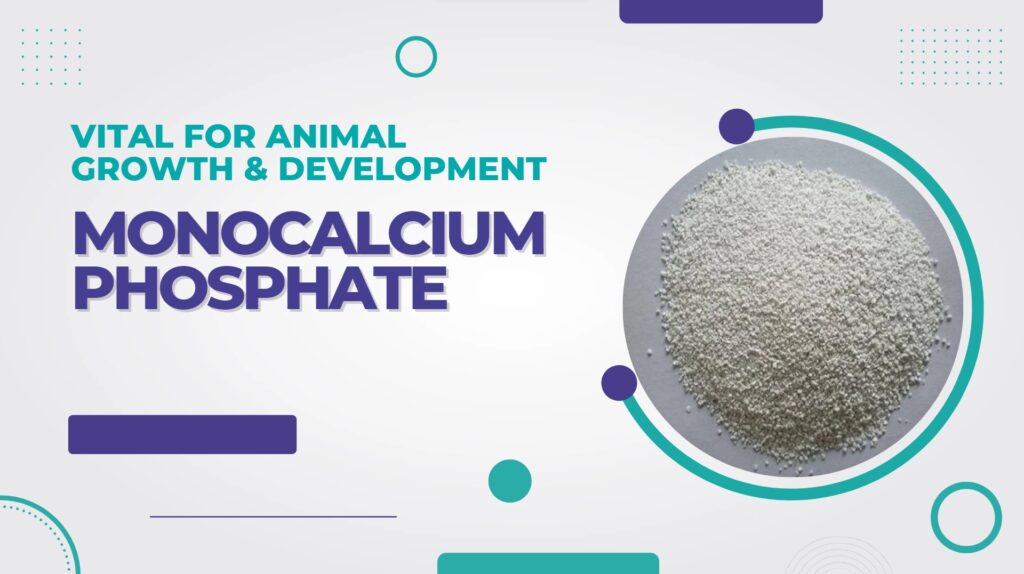Vital for Animal Growth & Development – Monocalcium Phosphate (MCP)

Monocalcium phosphate might sound like a mouthful, but it’s actually a crucial nutrient for the growth and development of animals. In this article, we’ll explore the importance of monocalcium phosphate, its benefits, and how it contributes to the health and well-being of our furry and feathered friends.
What is Monocalcium Phosphate (MCP)?
Monocalcium phosphate (MCP) is a compound commonly used in animal feed to provide essential nutrients like phosphorus and calcium. It’s typically derived from minerals like phosphate rock and limestone. This compound plays a vital role in supporting the growth and development of animals, from young livestock to mature poultry.
Monocalcium Phosphate Role in Animal Nutrition
Monocalcium phosphate serves as a primary source of phosphorus, a mineral critical for bone formation, energy metabolism, and overall growth. Additionally, it provides calcium, which is essential for skeletal strength, muscle function, and nerve transmission. Together, these nutrients support the structural integrity and physiological processes necessary for healthy animals.
Monocalcium Phosphate Benefits for Animal Health
- Stronger Bones and Teeth: By providing ample phosphorus and calcium, monocalcium phosphate contributes to the development of sturdy bones and teeth in animals. This is particularly crucial for young animals undergoing rapid growth phases.
- Improved Digestive Health: Phosphorus is involved in various metabolic processes, including energy production and nutrient absorption. Adequate levels of monocalcium phosphate in the diet can support optimal digestive function in animals.
- Enhanced Reproductive Performance: Proper nutrition, including sufficient phosphorus intake from monocalcium phosphate, is essential for reproductive success in animals. It can influence fertility, gestation, and the health of offspring.
Sources of Monocalcium Phosphate
Monocalcium phosphate can be obtained from natural sources such as phosphate rock or synthesized through chemical processes. Common sources include mineral deposits, where it occurs alongside other phosphorus-containing compounds, and manufactured products specifically designed for animal nutrition.
Dosage and Administration
The appropriate dosage of monocalcium phosphate varies depending on factors such as animal species, age, and nutritional requirements. It’s typically administered as part of a balanced diet, either mixed into feed formulations or provided as a supplement.
Safety Considerations
- Quality Assurance: When selecting monocalcium phosphate products, it’s essential to choose high-quality, reputable brands to ensure purity and consistency.
- Regulatory Compliance: Manufacturers must adhere to strict regulations regarding the production, labeling, and distribution of animal feed additives, including monocalcium phosphate.
Monocalcium Phosphate vs. Dicalcium Phosphate
While both compounds provide essential phosphorus and calcium, they differ in their chemical composition and nutritional profiles. Monocalcium phosphate contains one calcium atom, whereas dicalcium phosphate contains two. This distinction may influence factors such as solubility and bioavailability in animal diets.
Application in Animal Feed
Monocalcium phosphate is commonly incorporated into commercial feed formulations for various animal species, including poultry, swine, cattle, and aquaculture. It’s often combined with other ingredients to create balanced diets that meet the specific nutritional needs of each species and production stage.
Environmental Impact
The production and use of monocalcium phosphate can have environmental implications, particularly regarding phosphorus runoff and resource extraction. Sustainable practices, such as phosphorus recycling and efficient nutrient management, are essential for minimizing environmental impact and promoting long-term sustainability.
Conclusion
Monocalcium phosphate is not just a mouthful term; it’s a vital nutrient that supports the growth, development, and overall health of animals. From strengthening bones to enhancing reproductive performance, this compound plays a crucial role in animal nutrition. By understanding its benefits and proper usage, we can ensure the well-being of our animal companions.
FAQs (Frequently Asked Questions)
1. What animals benefit from monocalcium phosphate supplementation?
Animals across various species, including poultry, swine, cattle, and aquaculture, can benefit from monocalcium phosphate supplementation. It’s particularly important for young animals during periods of rapid growth.
2. How can I ensure the quality of monocalcium phosphate products?
Choose products from reputable manufacturers that adhere to strict quality control standards and regulatory requirements. Look for certifications and third-party testing to verify product quality and purity.
3. Are there any side effects associated with monocalcium phosphate supplementation?
When used according to recommended guidelines, monocalcium phosphate supplementation is generally safe. However, excessive intake may lead to imbalances in calcium and phosphorus levels, potentially affecting bone health.
4. Can monocalcium phosphate be used in organic animal feed?
Yes, certain forms of monocalcium phosphate are approved for use in organic animal feed production. However, it’s essential to verify compliance with organic certification standards and regulations.
5. How does monocalcium phosphate contribute to sustainable agriculture?
Monocalcium phosphate plays a role in sustainable agriculture by supporting optimal animal nutrition, reducing reliance on synthetic additives, and promoting efficient nutrient utilization. Additionally, sustainable sourcing practices can minimize environmental impact.
For trade enquiries & partnership, get in touch with us today!
Call Us
Shivam Vasant : +91 9920642235
Office : +9122 – 26821114 / 1115
shivam@shivamchem.com